Authentic Egypt experiences, When people think of Egypt, images of the Pyramids of Giza, the Sphinx, or the sunny Red Sea resorts often come to mind. But beyond the golden beaches and five-star hotels lies a completely different world — one of ancient traditions, vibrant markets, and genuine Egyptian hospitality.
To truly experience the soul of Egypt, you need to step beyond the resort gates and immerse yourself in everyday life. From the tranquil rhythm of traditional Nubian villages to the warmth of Bedouin hospitality and the energy of local markets, Egypt’s heart beats strongest where the tourists rarely tread.
In this in-depth guide, we’ll explore how to go beyond the resorts and discover authentic Egypt — the experiences that reveal the country’s real spirit, people, and culture.
1. Why Explore Egypt Beyond the Resorts?
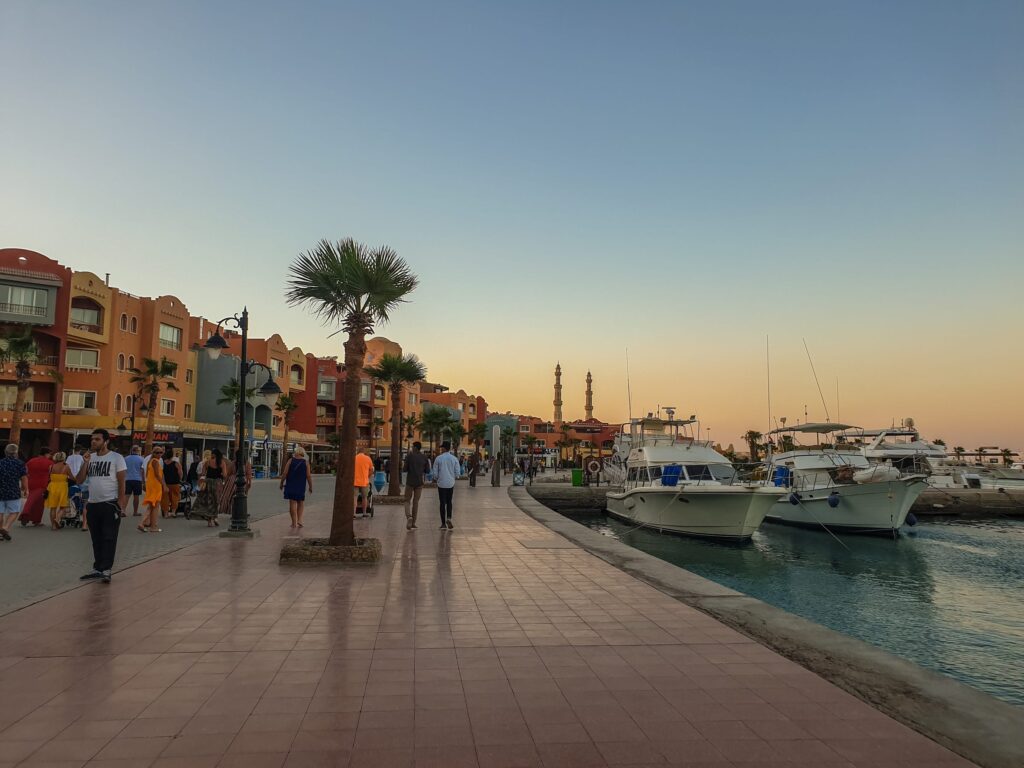
Most travelers to Egypt stay in destinations like Hurghada, Sharm El-Sheikh, or Marsa Alam — famous for their beaches, coral reefs, and luxury hotels. While these resorts are beautiful and comfortable, they often offer only a glimpse of what Egypt truly is.
Venturing into the local villages, desert camps, and markets opens a window into everyday Egyptian life. You’ll see how ancient traditions are preserved, meet people who live close to the land, and taste foods prepared the same way for centuries.
Here’s what makes exploring Egypt beyond the resorts so rewarding:
- You’ll experience authentic cultural interactions instead of tourist shows.
- You’ll support local communities and family-run businesses.
- You’ll gain a deeper understanding of Egyptian history, art, and hospitality.
- And most importantly — you’ll create memories that go far beyond a beach holiday.
2. The Warm Heart of Egypt: Bedouin Hospitality
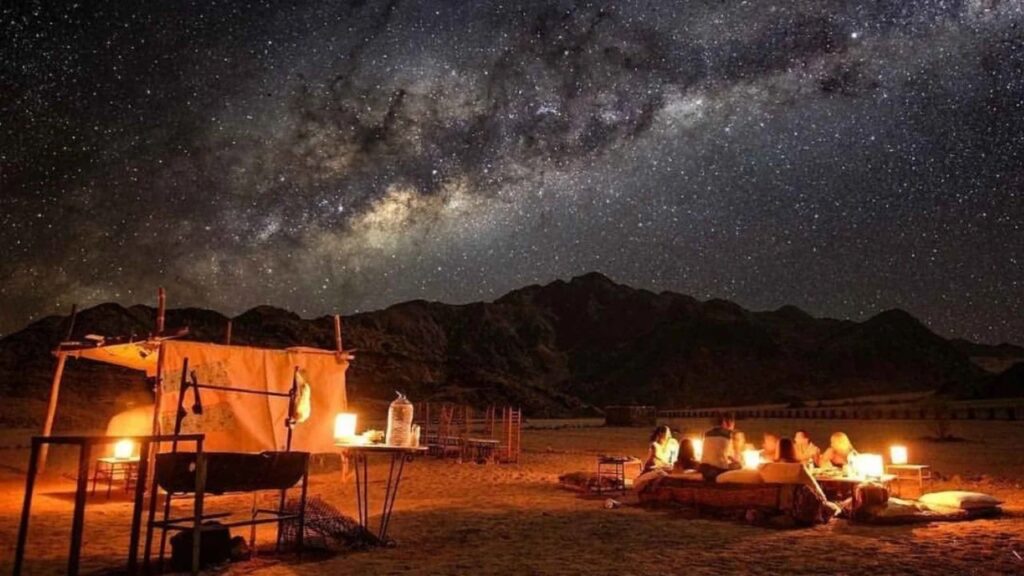
The Bedouins, the desert-dwelling tribes of Egypt’s Sinai and Eastern Desert, are legendary for their hospitality. Visiting a Bedouin camp is not only a cultural experience — it’s a journey into a way of life shaped by the desert’s vast silence and timeless beauty.
Bedouin Traditions and Lifestyle
For centuries, Bedouins have lived as nomads, herding camels and goats, and moving across the desert in search of water and grazing land. Today, many Bedouins still preserve their traditions while welcoming guests to learn about their culture.
What to Expect in a Bedouin Experience
When you visit a Bedouin village or camp, expect to be greeted with genuine warmth. You’ll likely be offered sweet Bedouin tea, flavored with herbs like sage or mint, served in small glasses around a crackling fire.
Meals are simple but delicious — often flatbread baked on the sand, grilled chicken, rice, and fresh vegetables. Guests are treated with respect and seated on colorful rugs under the open desert sky.
In the evening, many camps host small music gatherings where Bedouins play drums and sing traditional songs that echo through the dunes.
Activities and Adventures
A Bedouin excursion can include:
- Camel rides across the sand dunes at sunset.
- Stargazing — with some of the clearest night skies you’ll ever see.
- Traditional cooking demonstrations.
- Storytelling about desert life and Bedouin legends.
This experience connects you to Egypt’s ancient desert culture — one of simplicity, respect for nature, and hospitality unmatched anywhere in the world.
3. Discovering the Colorful Nubian Villages of Aswan
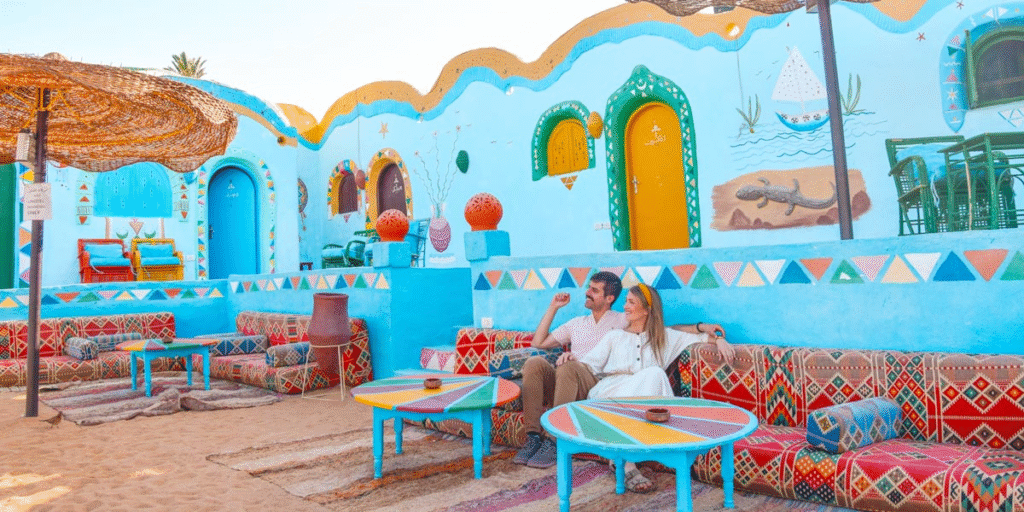
Far in the south of Egypt, along the tranquil shores of the Nile near Aswan, you’ll find the colorful homes and warm smiles of the Nubian people — one of Egypt’s oldest and most culturally rich communities.
A Glimpse into Nubian Culture
The Nubians have inhabited the Nile Valley for thousands of years, with roots even older than the Pharaohs. Their villages are famous for their brightly painted houses, often in shades of blue, pink, and turquoise, decorated with traditional geometric patterns.
The Nubian language, music, and crafts are distinct, reflecting their long history and connection to both Africa and the Nile.
Visiting a Nubian Village
You can visit a Nubian village by taking a boat ride from Aswan. As you approach, you’ll notice the houses rising from the riverbank like a living rainbow.
Once there, you can:
- Meet local families who often open their homes to visitors.
- Sample Nubian food, such as spicy stews and handmade bread.
- Shop for handicrafts, including colorful textiles and jewelry.
- Learn about Nubian heritage through art and storytelling.
Some families even invite guests to stay overnight — offering a rare opportunity to experience daily life by the Nile in a completely authentic setting.
4. The Pulse of Egypt: Local Markets and Bazaars

Authentic Egypt experiences:
If you want to feel the heartbeat of Egypt, spend time wandering through a local souk or market.
Markets are where Egyptians gather to shop, socialize, and bargain — just as they have for centuries. Every sense is engaged: the vibrant colors of spices, the aroma of grilled corn, the sound of merchants calling out prices, and the laughter of families going about their day.
The Famous Khan el-Khalili Bazaar in Cairo
This historic market in Old Cairo is a must-visit for anyone who loves shopping and photography. Founded in the 14th century, Khan el-Khalili is a labyrinth of narrow streets filled with:
- Brass lamps, handmade jewelry, and leather goods.
- Perfumes, spices, and incense.
- Traditional Egyptian clothing, such as galabiyas and scarves.
Stop at one of the old cafés — like the legendary El Fishawy Café, open since 1773 — for a cup of strong coffee or sweet mint tea while people-watching.
Regional Markets Worth Exploring
Outside of Cairo, each region has its own local flavor:
- Aswan Souk — famous for Nubian crafts, baskets, and spices.
- Luxor Market — filled with papyrus art, alabaster carvings, and jewelry.
- Hurghada’s El Dahar Market — where locals shop for fresh produce and fish.
- Bedouin markets in Sinai — offering handwoven rugs and silver ornaments.
When visiting markets, remember that bargaining is part of the experience — done with humor and respect. Egyptians enjoy friendly negotiation, and it’s often accompanied by smiles and laughter.
5. Traditional Egyptian Food Experiences
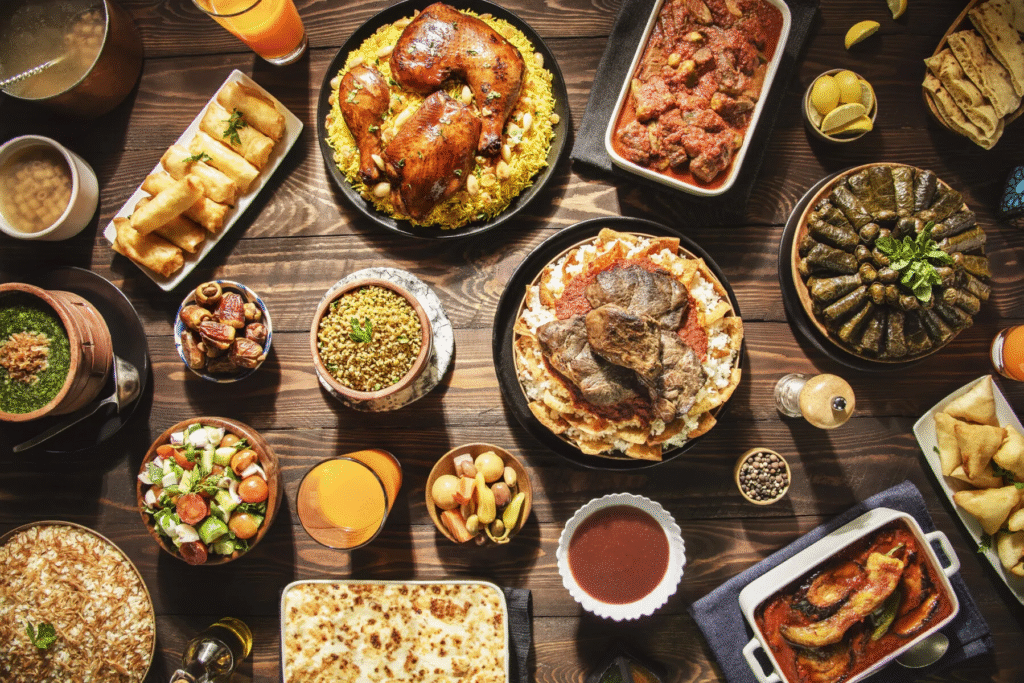
One of the best ways to connect with Egyptian culture is through its food. Beyond resort buffets, you’ll find a world of traditional dishes prepared with love, history, and local ingredients.
Must-Try Egyptian Dishes
- Koshari – Egypt’s national comfort food made with rice, pasta, lentils, chickpeas, and spicy tomato sauce.
- Ful medames – slow-cooked fava beans served for breakfast with olive oil, lemon, and bread.
- Molokhia – a green soup made from jute leaves, often served with rice or chicken.
- Mahshi – vegetables stuffed with spiced rice and herbs.
- Grilled kofta and kebab – juicy, flavorful meat dishes often enjoyed outdoors.
Eat Like a Local
For the best experience:
- Try street food stalls in Cairo or Alexandria.
- Visit local family-run restaurants instead of hotel buffets.
- Join a cooking class or food tour — many are available in Luxor, Cairo, and Hurghada.
Sharing a meal in Egypt is more than eating; it’s an act of community and friendship. Don’t be surprised if locals invite you to sit and share a plate — it’s a gesture of warmth and welcome.
6. Life in the Countryside: Visiting Rural Egyptian Villages
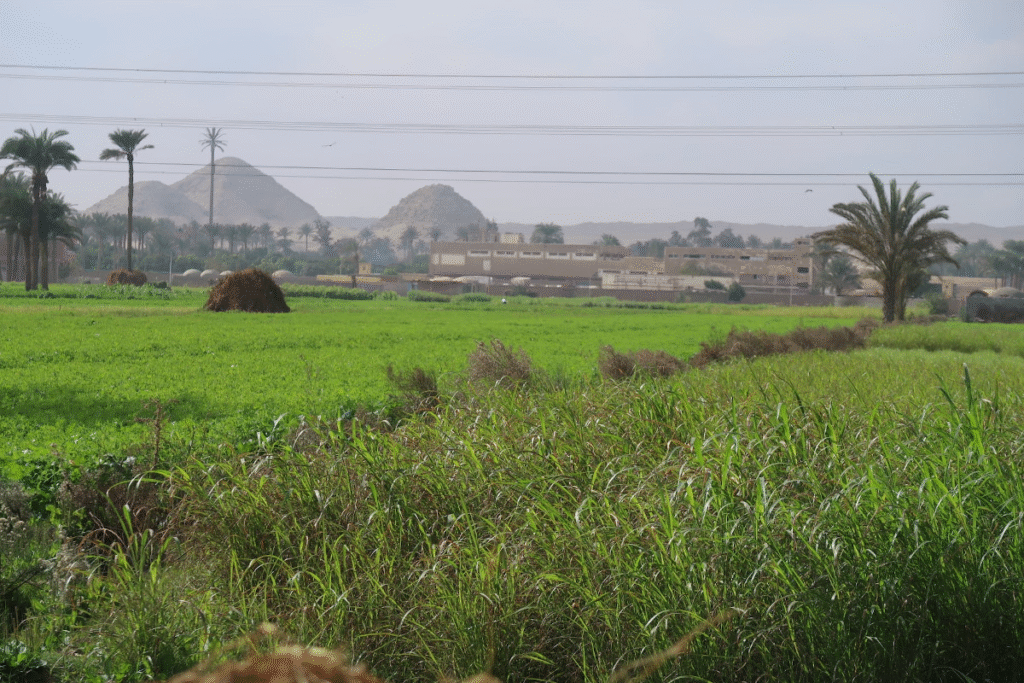
Authentic Egypt experiences:
Beyond the big cities and tourist hubs lies rural Egypt — a world of green fields, water buffalo, and quiet village life along the Nile Delta.
Experiencing Daily Life
Villagers rise early to work the fields, fish in the canals, and tend to their animals. Life moves slowly, following the rhythm of the seasons. Visiting such villages offers a glimpse into traditional farming methods that have barely changed since pharaonic times.
You may see:
- Farmers using wooden plows drawn by donkeys.
- Women baking flatbread in clay ovens.
- Children running barefoot through palm groves.
Responsible Travel Tips
When visiting villages:
- Always ask before taking photos.
- Support local crafts and home-cooked meals.
- Dress modestly out of respect for the local culture.
- Consider using local guides who can translate and introduce you respectfully.
This kind of cultural exchange enriches both travelers and hosts, creating genuine human connections beyond language barriers.
7. Coptic Heritage and Spiritual Traditions
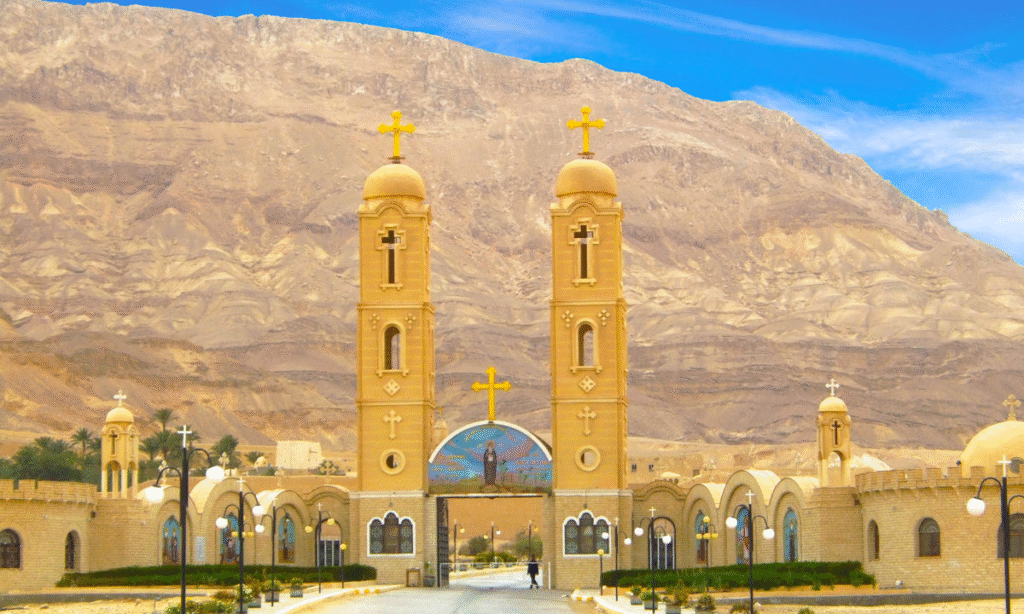
Authentic Egypt experiences:
Egypt is not only the land of the Pharaohs — it’s also home to one of the world’s oldest Christian communities, the Coptic Church. Exploring Egypt’s Coptic heritage offers insight into an ancient spiritual tradition that still thrives today.
Key Sites to Visit
- The Hanging Church (Cairo) – built above a Roman gatehouse, it’s one of Egypt’s oldest churches.
- Saint Anthony’s Monastery – located in the Eastern Desert, near the Red Sea coast, founded in the 4th century.
- Saint Catherine’s Monastery (Sinai) – a UNESCO World Heritage Site at the foot of Mount Sinai, where Moses is said to have received the Ten Commandments.
Visiting these sacred sites provides a profound connection to Egypt’s spiritual past — a side of the country often overlooked by those who stay only at the beach.
8. Artisans, Crafts, and Traditional Workshops
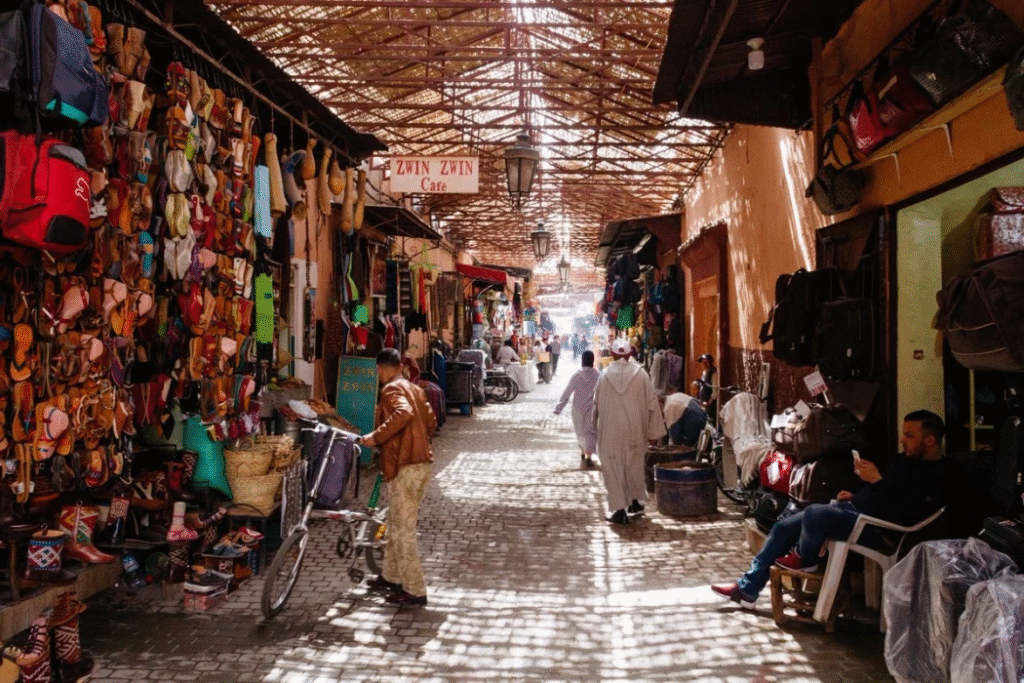
Egypt’s artistic heritage goes far beyond the treasures in museums. Across the country, artisans continue to practice ancient crafts passed down through generations.
Where to See Artisans at Work
- Old Cairo’s tentmakers’ market (Souq al-Khayamiya) — known for colorful fabric appliqué used in tents and decorations.
- Luxor and Aswan workshops — producing alabaster statues and handmade pottery.
- Siwa Oasis — famous for its salt lamps, date products, and embroidered clothing.
- Bedouin women’s cooperatives — creating carpets, jewelry, and baskets.
Buying directly from these workshops supports local artisans and helps preserve traditional Egyptian crafts.
9. The Desert Experience: Silence, Stars, and Sand
Egypt’s deserts — the Western Desert and Sinai Desert — offer some of the most breathtaking landscapes in North Africa. Far from the crowds, the vastness of the desert teaches travelers a new kind of peace.
Desert Adventures
- 4×4 jeep safaris through sand dunes and canyons.
- Overnight camping under the Milky Way.
- Hot springs and white chalk formations in the White Desert.
- Hiking in the Colored Canyon or Sinai Mountains.
The stillness, the endless stars, and the feeling of timelessness make this one of the most transformative experiences in Egypt — one that stays with you long after you return home.
10. Festivals, Music, and Everyday Joy

Authentic Egypt experiences:
Egyptians know how to celebrate life. From weddings and harvest festivals to religious holidays and music performances, joy is deeply embedded in Egyptian culture.
Popular Local Celebrations
- Moulids (Saint festivals) – colorful street festivals honoring saints, with music, dancing, and food.
- Ramadan evenings – when families gather to break the fast and streets light up with lanterns.
- Nile festivals and local concerts – featuring folk musicians and belly dancers.
Joining in these celebrations (respectfully, of course) gives you a glimpse into the vibrant rhythm of Egyptian life.
11. Responsible and Respectful Travel
Exploring Egypt beyond the resorts comes with responsibility. As a guest, it’s essential to travel with awareness and respect.
Key Tips for Responsible Travel in Egypt:
- Dress modestly, especially in rural or religious areas.
- Ask permission before photographing people.
- Buy local, supporting small businesses and artisans.
- Avoid single-use plastics and littering.
- Respect cultural norms — for example, public displays of affection are not common.
- Learn a few Arabic phrases like “Shukran” (Thank you) — locals appreciate the effort.
Responsible tourism helps preserve Egypt’s culture while ensuring local communities benefit directly from visitors.
12. Final Thoughts: Finding the Real Egypt
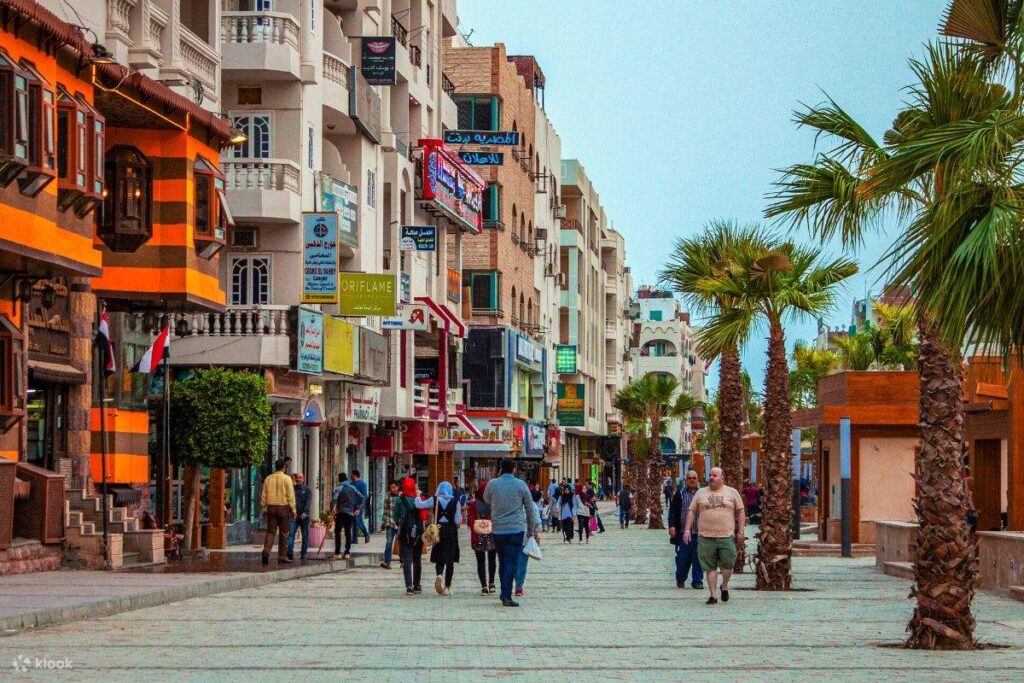
Authentic Egypt experiences, Egypt is more than a destination — it’s a living story, told through its people, traditions, and landscapes.
The beaches of the Red Sea are stunning, but the true beauty of Egypt lies beyond the resorts: in the laughter of children in Nubian villages, the aroma of fresh bread baking in clay ovens, the rhythm of drums in the desert night, and the endless kindness of people who welcome strangers as friends.
By stepping beyond the typical tourist path, you’ll experience a side of Egypt that few travelers ever see — one that will touch your heart and stay with you forever.







